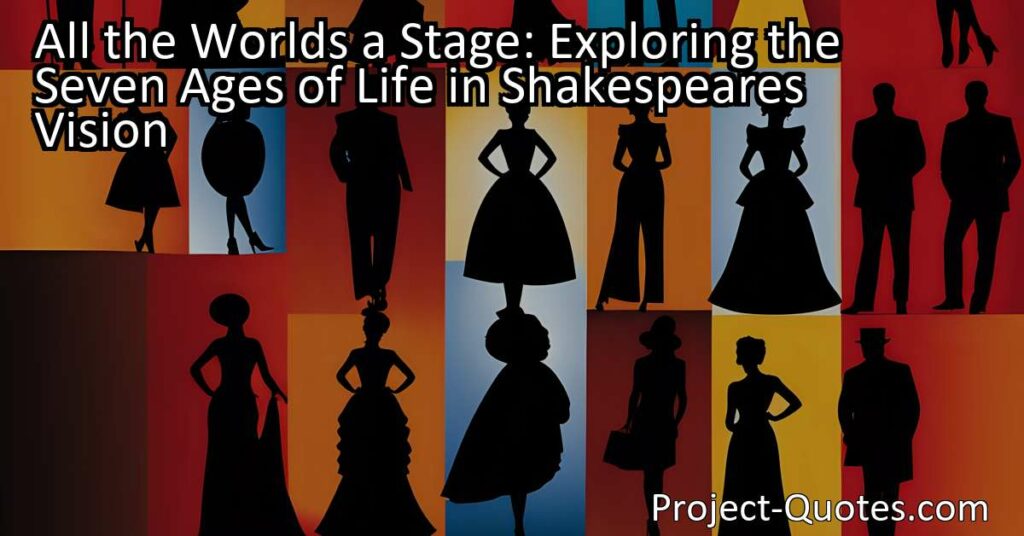All the world’s a stage, and all the men and women merely players: they have their exits and their entrances and one man in his time plays many parts, his acts being seven ages.
William Shakespeare
Shakespeare’s quote, “All the world’s a stage,” introduces the idea that life is like a grand play, with each individual playing multiple roles in seven distinct stages. From helpless infancy to the wisdom of old age, this metaphor invites us to reflect on the transient and interconnected nature of the human experience.
Table of Contents
- 1 All the world’s a stage, and all the men and women merely players: they have their exits and their entrances and one man in his time plays many parts, his acts being seven ages.
- 2 William Shakespeare
- 3 Meaning of Quote – All the world’s a stage, and all the men and women merely players: they have their exits and their entrances and one man in his time plays many parts, his acts being seven ages.
- 4 Freely Shareable Quote Image
- 5 Related
Meaning of Quote – All the world’s a stage, and all the men and women merely players: they have their exits and their entrances and one man in his time plays many parts, his acts being seven ages.
Imagine a grand theater, with its vibrant stage and colorful curtains. This is the setting that William Shakespeare invites us into with his famous quote, “All the world’s a stage, and all the men and women merely players: they have their exits and their entrances and one man in his time plays many parts, his acts being seven ages.” With these words, Shakespeare beautifully encapsulates the idea that life itself is like a theatrical production, and each individual is a participant in this grand play.
In this metaphorical stage of life, Shakespeare suggests that all human beings are merely actors, each with their own unique entrances and exits. Just like in a theatrical production, individuals have their moments of arrival, making grand entrances into the world, and their moments of departure as they exit the stage of life. This notion not only emphasizes the transitory nature of human existence but also suggests that we are all performers, wearing different masks and playing different roles throughout our lives.
Furthermore, Shakespeare notes that one man, in his time, plays many parts, dividing life into seven distinct ages or acts. This concept mirrors the structure of a play, wherein each act represents a different phase or stage of life. Let’s explore these seven ages or acts, which define the human journey from infancy to old age.
The first age, according to Shakespeare, is the stage of infancy, represented by a helpless and innocent baby. It is a time of complete dependency, where the child relies on its caretakers for survival. At this stage, every action and expression of the tiny human is met with adoration and attention from those around them.
As the child grows older, they enter the second stage, known as the schoolboy age. Here, the child begins their educational journey, learning the ways of the world and gaining knowledge that will shape their future. This stage is marked by curiosity, mischief, and a gradual understanding of social norms.
The third stage, also known as the lover’s age, represents the passionate and sometimes tumultuous period of adolescence and young adulthood. Shakespeare portrays this stage as a time of intense emotions, where young hearts experience the joys and sorrows of love. It is during this act that individuals begin to explore their own identities and seek companionship.
Moving on to the fourth stage, we reach the stage of the soldier. This phase symbolizes the prime of life, where individuals take on responsibilities, face challenges, and contribute to society. It represents a time of hard work, dedication, and the pursuit of goals and achievements. Just like a soldier on the battlefield, those in this stage are expected to show strength and resilience in navigating life’s obstacles.
The fifth stage, known as the justice age, reflects a period of contemplation and reflection. It represents the stage of middle age, where individuals begin to take on a more parental and authoritative role. With the responsibilities of family and career weighing on their shoulders, those in this stage often strive for stability and the pursuit of justice.
The sixth stage, marked as the pantaloon age, captures the stage of old age. Here, individuals may start to experience declining health and energy, and the fruits of their labor begin to bear testimony. This stage is often associated with retirement and a sense of nostalgia for the past. Despite the challenges that come with aging, these individuals contribute their wisdom and experience to the world.
Lastly, Shakespeare presents the final stage, which he refers to as the second childishness and mere oblivion. This stage represents the last act of life, where individuals enter into senility and depend on others for care. It is a time when people revert to a childlike state, requiring assistance and support to meet their basic needs. Shakespeare’s inclusion of this stage reminds us of the ultimate equalizer of humanity: the universality of mortality.
Through this powerful metaphor, Shakespeare provokes us to reflect on the various roles and stages we play throughout our lives. Each stage offers its unique challenges, joys, and lessons. Just like actors in a play, we must embrace our roles and make the most of every act, knowing that the time will come for us to exit the stage.
Moreover, this quote serves as a reminder of the interconnectedness of humanity. Just as performers rely on one another for a successful production, we too rely on the presence and support of our fellow players. Our journeys intersect and overlap, creating a complex tapestry of human experiences.
In conclusion, William Shakespeare’s quote, “All the world’s a stage, and all the men and women merely players: they have their exits and their entrances and one man in his time plays many parts, his acts being seven ages,” invites us to view life as a theatrical spectacle. Through the vivid imagery of a stage, Shakespeare emphasizes the transient nature of human existence and the multiple roles we assume throughout our lives. This profound metaphor encourages us to embrace our parts, seize the opportunities that come our way, and appreciate the beauty and interconnectedness of the human experience.
I hope this quote inspired image brings you hope and peace. Share it with someone who needs it today!


